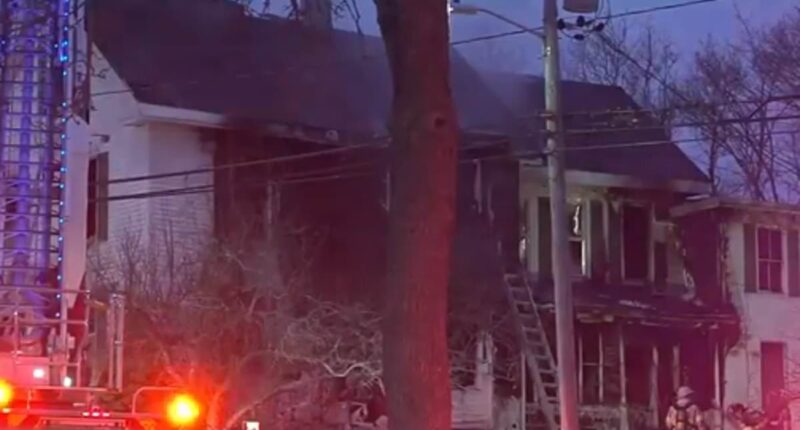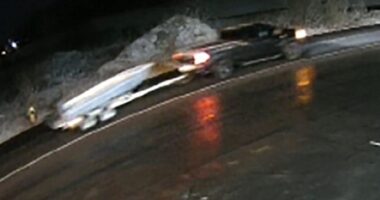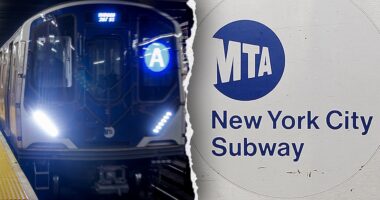A historic Maine home mysteriously caught fire earlier this week, destroying the four-bedroom property as it emerged the owner owes nearly $73,000 in property taxes.
The 2,388-square-foot home caught fire just before 5am on Tuesday with no one was inside at the time, a spokesman from the Bangor Fire Department said.
Owned by James Butler Jr., 63, the Lincoln Street property was declared vacant by the city in 2017, and was later placarded as the home had no active water or sewer connections.
At least six fire departments responded to the blaze, as crews noticed heavy flames appearing from all three stories of the house.
At one point in their rescue, Bangor’s Assistant Fire Chief, Chandler Corriveau, said the fire ‘was so intense’ they had to pull responders out of the building.
‘Lot of digging, a lot of hot spots, we have tin ceilings, balloon frame construction so the fire ran from the first floor all the way to the third floor and as you can see it’s a pretty large building,’ Corriveau, said.
The cause of the damaging fire is yet to be released.
The owner owes $73,000 in back taxes for two of six Bangor properties he owns, according to the city’s treasurer department.

A historic Maine home mysteriously caught fire earlier this week, destroying the 4-bedroom property whose owner owes nearly $73,000 in property taxes. Pictured: The torched vacant 67 Lincoln Street home in Bangor, Maine

James Butler Jr., who owns five buildings and an empty plot of land in Bangor, owes $73,000 in back taxes for two of his six properties, according to the city’s treasurer department, a slight decrease from the $84,000 he reportedly owned in 2021. Pictured: The vacant 67 Lincoln Street home before the devastating December 3 fire
Butler’s current property tax debt is only a slight decrease from the $84,000 he reportedly owned the city in 2021.
The Hampden-native – who reportedly ran an unsuccessful campaign for Bangor City Council in 2021 – owns properties at 72, 181 and 424 State Street, 125 Warren Street and 67 Lincoln Street as well as an empty lot in the 100 block of Buck Street.
Of the several properties owned by Butler, four appear on the city’s vacant list, and the fifth appears to be unoccupied and in a dilapidated state.
City officials found several code violations at Butler’s 72 State Street property, which was formerly a dentist office, as they discovered the building ‘was not safe for people to live or work,’ city solicitor David Szewczyk said.
His third property on State Street, 424, is not listed with the others, yet, appears to be in distress as it presents multiple broken windows, missing shingles and an extremely overgrown landscape, Bangor Daily News reported.
The torched Lincoln Street home is just one of many known vacant properties scattered across the 31,000 population town, as owners – including out-of-state banks – allow the buildings to sit empty for long periods of time, amounting to potential safety hazards and restricting available housing.
Now, 76 properties remain vacant in Bangor, a city official said, noting the affect the vacant properties have on the ‘already tight market’ and the state-wide demand for housing.
‘We have a housing shortage and it’s not good for the city to have a whole bunch of vacant residential buildings,’ Szewczyk said.


The 63-year-old owes approximately $73,000 in back taxes for his 72 and 181 State Street properties, according to the city’s treasurer department, a slight decrease from the $84,000 he reportedly owned in 2021
Vacant properties can be added to the city’s list in a number of ways, however, once deemed ‘vacant’ the owner has 60 days to obtain a permit and pay the registration fee.
Such permit is valid for six months, after which fees double for each renewal, capping at $4,000, but a vacant property owner will eventually pay $8,000 annually if the home remains empty for a number of years.
Butler’s properties at 72 State Street, 181 State Street and 67 Lincoln Street were registered as such on May 1, however, those registrations expired in November.
Maine law states that if your taxes are unpaid, the collector can sell your home at a public auction on the first Monday in February after the tax was assessed, Maine Legislature reads.

















